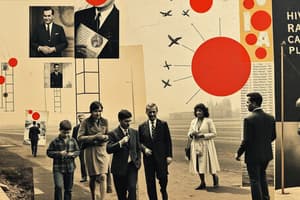Podcast
Questions and Answers
What does anthropological positionality refer to?
What does anthropological positionality refer to?
- The ability to analyze data without bias.
- The use of technology in anthropological studies.
- The influence of an anthropologist's identity on their research. (correct)
- The tendency to impose one's culture on others.
Which theory suggests that societies function like an organism with interconnected parts?
Which theory suggests that societies function like an organism with interconnected parts?
- Symbolic Anthropology
- Structural Functionalism (correct)
- Conflict Theory
- Cultural Relativism
What concept focuses on how a ruling group's dominance is maintained through cultural means?
What concept focuses on how a ruling group's dominance is maintained through cultural means?
- Hegemony (correct)
- Cultural Relativism
- Imagined Communities
- Collective Effervescence
Which term describes the process that results in cultural changes through prolonged contact?
Which term describes the process that results in cultural changes through prolonged contact?
What does reflexivity in anthropology involve?
What does reflexivity in anthropology involve?
Which theory critiques universal truths and examines power dynamics in knowledge?
Which theory critiques universal truths and examines power dynamics in knowledge?
What does the term 'sacred' refer to in anthropological terms?
What does the term 'sacred' refer to in anthropological terms?
What concept examines identity construction through differentiation between the 'Self' and the 'Other'?
What concept examines identity construction through differentiation between the 'Self' and the 'Other'?
Which concept describes the overarching set of learned behaviors and values that shape how individuals perceive the world?
Which concept describes the overarching set of learned behaviors and values that shape how individuals perceive the world?
What term refers to the process of becoming a member of society by adopting its norms and values?
What term refers to the process of becoming a member of society by adopting its norms and values?
Which of the following best defines the concept of 'power' in a societal context?
Which of the following best defines the concept of 'power' in a societal context?
What term is used to describe the transitional state in which normal social roles are suspended?
What term is used to describe the transitional state in which normal social roles are suspended?
Which concept implies a social system where success is determined by individual ability and effort?
Which concept implies a social system where success is determined by individual ability and effort?
What is referred to as the culturally constructed notion of what defines a person?
What is referred to as the culturally constructed notion of what defines a person?
Which of the following terms is synonymous with non-biological relationships that are treated as kin?
Which of the following terms is synonymous with non-biological relationships that are treated as kin?
Which term reflects the influence of societal structures over individual actions in shaping outcomes?
Which term reflects the influence of societal structures over individual actions in shaping outcomes?
Flashcards
Culture
Culture
Shared beliefs, practices, and values that shape a group's worldview and lifestyle.
Society
Society
Organized groups of people with relationships and interactions forming a cohesive unit.
Identity
Identity
Characteristics defining individuals or groups, formed by culture and experience.
Power
Power
Signup and view all the flashcards
Social Relations
Social Relations
Signup and view all the flashcards
Beliefs & Knowledge
Beliefs & Knowledge
Signup and view all the flashcards
Social Institutions
Social Institutions
Signup and view all the flashcards
Change
Change
Signup and view all the flashcards
Anthropological Positionality
Anthropological Positionality
Signup and view all the flashcards
Reflexivity
Reflexivity
Signup and view all the flashcards
Social Control
Social Control
Signup and view all the flashcards
Collective Effervescence
Collective Effervescence
Signup and view all the flashcards
Sacred vs. Profane
Sacred vs. Profane
Signup and view all the flashcards
Rites of Passage
Rites of Passage
Signup and view all the flashcards
Cultural Relativism
Cultural Relativism
Signup and view all the flashcards
Structural Functionalism
Structural Functionalism
Signup and view all the flashcards
Study Notes
Key Concepts in Cultural and Social Studies
- Culture: Learned beliefs, practices, symbols, and values forming worldview and lifestyle.
- Society: Organized groups with relationships and interactions.
- Identity: Characteristics defining individuals or groups, shaped by culture and experience.
- Power: Influence or control over behavior and outcomes.
- Social Relations: Interactions among individuals within social structures.
- Beliefs and Knowledge: Shared truths shaping interpretations of the world.
- Symbolism: Use of symbols to convey meanings.
- Materiality: Physical objects with cultural/social significance.
- Change: Alteration of cultural/social elements, driven by internal or external forces.
- Structure and Agency: Balance between societal norms and individual action shaping outcomes.
- Norms: Rules governing social behavior.
- Values: Shared principles about what's important.
- Socialization: Learning societal norms and values.
- Enculturation: Learning and adopting one's native culture.
- Personhood: Culturally constructed concept of personhood.
- Ritual: Symbolic actions within cultural traditions.
- Liminality: Transitional state with suspended social roles.
- Belonging: Sense of acceptance within a group.
- Kinship: Socially recognized relationships based on blood/marriage.
- Fictive Kin: Non-biological relationships treated as kin.
- Social Institutions: Systems of norms/values guiding behavior.
- Meritocracy: Success based on ability and effort.
- Holism: Interconnectedness of cultural systems approach.
- Fieldwork: On-site research for cultural understanding.
- Ethnography: Written account of anthropological research.
- Anthropological Positionality: Awareness of researcher's identity in research.
- Reflexivity: Critical self-reflection on perspective in research.
- Social Control: Mechanisms enforcing norms.
- Collective Effervescence: Shared group energy during rituals.
- Sacred and Profane: Distinctions between holy/everyday.
- Rites of Passage: Rituals marking life transitions.
Key Theories in Anthropology and Sociology
- Cultural Relativism (Franz Boas): Understanding cultures within their own context, avoiding judging by external standards.
- Structural Functionalism (Émile Durkheim): Society's parts work together for stability and cohesion; religion unites people with shared beliefs.
- Symbolic Anthropology (Clifford Geertz): Culture as a "web of meaning" interpreted through symbols.
- Hegemony (Antonio Gramsci): Ruling groups maintain power through cultural dominance, not just force.
- Self and Other: Anthropological concept of constructing identities through differentiation.
- Imagined Communities (Benedict Anderson): Nations are socially constructed communities, imagined as shared identities.
- Ethnocentrism: Judging other cultures by one's own standards, leading to misunderstandings.
- Acculturation (Redfield, Linton, Herskovits): Cultural change from prolonged contact, often involving power imbalances.
- Postmodernism (Michel Foucault): Critiques universal truths, focusing on power and subjectivity.
- Conflict Theory (Karl Marx): Social change arises from conflicts over resources, power, and inequality.
Studying That Suits You
Use AI to generate personalized quizzes and flashcards to suit your learning preferences.




